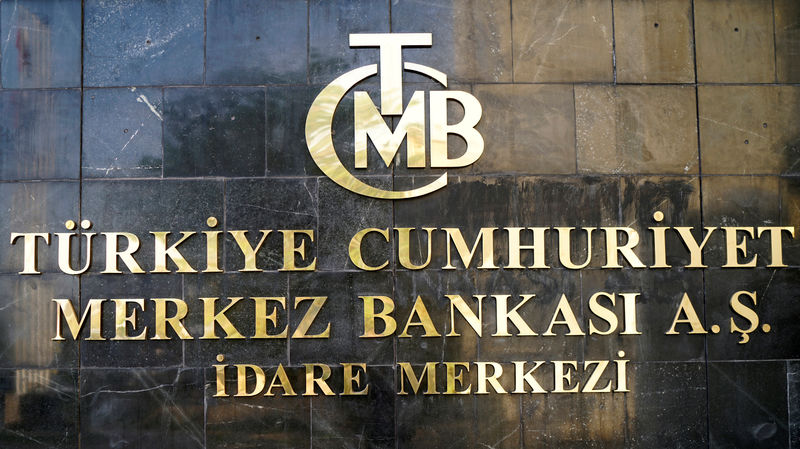By Nevzat Devranoglu and Orhan Coskun
ANKARA (Reuters) - Turkey's central bank is set to adjust a tool it introduced this summer to boost lending in specific sectors of the recession-hit economy, starting by tweaking reserve requirements to squeeze more credit from lenders, two people familiar with the matter said.
The planned move, which has not yet been reported, could be one of the boldest to kick-start growth after last year's currency crisis pushed Ankara into sometimes unorthodox steps to defend the lira and revive lending.
Under the plan, the central bank would strengthen the link between lending and reserve requirements and adjust settings regularly to steer credit toward sectors such as construction and energy, which remain mired in bad loans, the sources told Reuters.
The central bank is set to sign off on the changes, they said, requesting anonymity due to the sensitivity of the matter.
Finance Minister Berat Albayrak and Central Bank Governor Murat Uysal have hinted publicly they would take such a step, but the government and the bank have made no announcements.
"We are adopting a policy framework that uses...tools such as required reserves effectively directed at the pace of increase of loans, their composition and their healthy growth in terms of sectoral distribution," Uysal said in Istanbul on Wednesday. [I7N26R00M]
Albayrak flagged plans in September to "redirect credit to the right spots", without elaborating.
The two sources said the first step is expected to be an adjustment to a rule adopted in August, when the bank lowered reserve requirements and raised remuneration rates for lenders that had 10% to 20% loan growth.
That move has helped lift credit growth, so the plan is to essentially double down and raise the loan-growth range.
A higher ceiling would help preserve the benefits for state banks on which the government has leaned to drive lending but which risk losses on their aggressive credit extension.
It may also encourage more reticent private banks closer to the 10% floor to extend more credit.
"Loan extensions need to seriously increase. Most private banks have not been taking the necessary initiative to extend loans until now," one of the sources said.
Two state banks risk running over the 20% ceiling and could "take a hit" if they do, so "precautions will be taken to prevent this," the source said.
The central bank has already slashed its benchmark interest rate by 10 percentage points since July to help hit an ambitious 5% government growth target for 2020.
The new powers could allow the central bank to funnel credit to export sectors that have long been eclipsed by imports. Turkey's yawning current account deficit last year helped spark the crisis that at its worst halved the value of the Turkish lira.
Such lending incentives could risk a rebound in inflation, which dipped below 10% last month after having soared above 25% last year.
The move also risks exacerbating Turkey's problem of tens of billions of dollars worth of bad loans still on banks' balance sheets. Lenders' non-performing loan (NPL) ratio is expected to rise to 6.3% by year-end.
LEANING ON CENTRAL BANK
The changes to reserve regulations are expected to be made over the next year, boosting lending in sectors such as construction, energy, exports and those boosting muted Turkish productivity, the sources said.
The central bank could prioritize sectors reliant on foreign-currency income at first, they said.
The second source said the bank may also discourage lending by banks with high levels of loan growth to ensure financial stability. "The system is not being designed in a one-sided way," the source said.
"The legal infrastructure is ready today," the source added of the plan.
Annual Turkish loan growth has edged up to about 5% from near zero in July, official data shows, in part thanks to the August adjustment to required reserves.
Fitch Ratings said growth has been "largely driven by state banks, resulting in erosion of their capital and profitability buffers." This month it said that at more than 18%, overall capital adequacy remains comfortable.
In July, weeks after President Tayyip Erdogan ousted the former central bank chief for not following instructions, the bank began a round of policy rate cuts to 14% from 24%.
In August, it cut the required reserve ratio for deposits of up to three-month maturity to 2% from 7% for banks with 10-20% loan growth.
It also set the rate those banks earn on lira-denominated reserves at 10% - and at zero for lenders with below 10% or above 20% loan growth.
Eight banks have benefited from these moves as of October, of which three are state banks, the second source said.
The first source said the government is considering raising both the 20% ceiling and the 10% floor.
"Even though there is a risk of inflation, implementing this system seems logical at this stage ... because there are problems with inflow of foreign resources," the source said.
